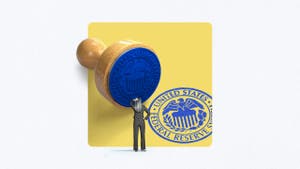
The Fed didn’t cut interest rates. Here are 5 things to watch next.
The big question: How long will the Fed be on hold?
About the author
Reporter and analyst Sarah Foster covers the Federal Reserve, the U.S. economy and economic policy for Bankrate, where she helps readers understand how the world’s most powerful policymakers in Washington, D.C., impact their personal finances. She’s covered the Federal Reserve and U.S. economy since 2018, when she joined the economics news team at Bloomberg News. She’s a member of the premiere association for business journalists, the Society for Advancing Business Editing and Writing (SABEW), has been selected as a Goldschmidt data fellow in both 2019 and 2020 and was named a Top Voice in Finance by LinkedIn in 2024.
Sarah’s network of sources includes over 100 economists, including academics as well as former Treasury Department and U.S. central bank officials. Above all else, she believes in thorough reporting and interviews, using experts to help guide her work in accurately translating one of the most complicated topics in finance for everyday people.
Readers can tune into her articles for answers to key questions about the job market and inflation, as well recession odds, what downturns mean for consumers’ livelihoods, as well as how much more expensive it may get to borrow money. She hopes to show consumers that the U.S. economy isn’t just numbers, facts or data. It’s people with livelihoods, careers, dreams and stories.
Before becoming a business journalist, Sarah worked as a copy editor and newspaper designer at the Chicago Tribune and the Chicago Daily Herald. When she’s not covering a Fed meeting or exploring her favorite data website FRED, Sarah enjoys writing music, playing her three main instruments (piano, flute and bass), reading every Janet Yellen book she can get her hands on and posting fun economy-driven explainer videos as the Accidental Economist on Instagram and TikTok.
Sarah wants you to know
Foster describes herself as an “accidental economist.” Originally from a town of 300 in rural Illinois, she unknowingly developed a passion for the subject area while watching her community recover from tougher times during her childhood. She now knows that period was the Great Recession.
Joblessness soared. Businesses and factories shuttered, and nothing came to take their place. Homelessness in her area climbed, while food banks couldn’t keep up with the overwhelming demand. Nearly 1 in 4 families lived below the poverty line — among the highest rates in the state. She went on to write a series of articles about it for her high school newspaper.
It wasn’t until four years later, while writing a story about poverty in eastern Kentucky after the 2018 midterm elections, that she realized that passion project was an economics story — and maybe she wanted to do this all along.
“If I had been more exposed to economics, I would’ve known how much I had loved it from the start,” Foster says. “Economics isn’t as boring of a subject as your high school or college teachers might’ve made it seem. If you don’t love economics, that might just be because you haven’t given it a chance yet.”
The Federal Reserve is one of the most complex institutions in the world and easy to ignore; yet, its decisions impact consumers’ wallets more than any other policymaker in Washington, D.C. My goal is to remove some of the mystery surrounding the U.S. central bank and help you understand how it impacts your money, so you can be an even smarter consumer.
— Sarah Foster

The big question: How long will the Fed be on hold?

Bankrate analyzed the Fed’s historic rate moves for clues on what might come next.

Every financial decision you make is impacted by the Federal Reserve.

A complicated U.S. economy. Stubborn inflation and a jobless boom. Unprecedented conflict with the president. Personnel changes, and a new Fed chair. Federal Reserve officials are no stranger to difficult [...]

The U.S. may dodge a recession, but experts aren’t denying it: Something feels off.

Rates could soon be within range of their pre-pandemic peaks. There’s a catch.

Rates are falling, and finance pros say it may be time for Americans to rethink some strategies.

Overwhelmed state unemployment offices have left Americans without aid for weeks, if not longer.
We appreciate your feedback
Thank you for taking the time to share your experience.